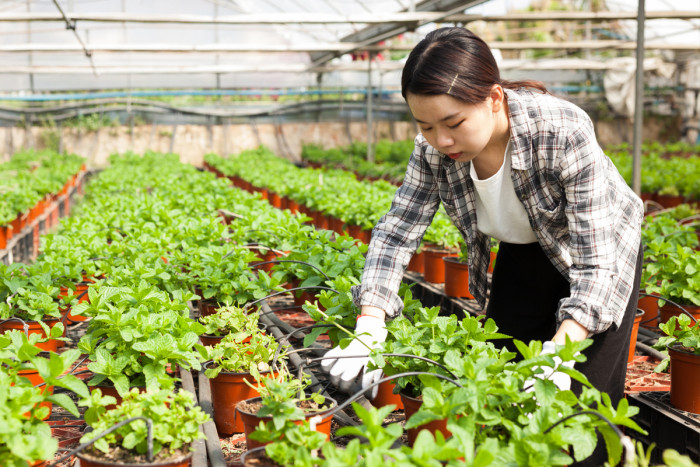Nursery Grower/Worker
Kaiwhakatipu/Kaimahi Otaota
Nursery growers/workers grow young plants, flowers, trees and shrubs for sale or for use in parks and gardens.
Pay
Nursery growers/workers usually earn
$24-$25 per hour
Senior nursery growers/workers usually earn
$25-$31 per hour
Source: careers.govt.nz research, 2020.
Job opportunities
Pay
Pay for nursery growers/workers varies depending on skills and experience.
- New nursery growers/workers can expect to earn the minimum wage.
- Nursery growers/workers with one to five years' experience usually earn up to $25 an hour.
- Senior nursery growers/workers and managers can earn up to $31 an hour.
Source: careers.govt.nz research, 2020.
- PAYE.net.nz website - use this calculator to convert pay and salary information
- Employment New Zealand website - information about minimum wage rates
(This information is a guide only. Find out more about the sources of our pay information)
What you will do
Nursery growers/workers may do some or all of the following:
- prepare soil mixes and composts
- grow plants from seeds and cuttings
- water, feed, prune, pot and label plants
- operate and maintain irrigation systems
- organise stock and dispatch of plants
- spray plants to control weeds, pests and diseases
- sell plants in a garden centre
- drive tractors, forklifts and delivery trucks.
Skills and knowledge
Nursery growers/workers need to have knowledge of:
- how to grow and care for plants
- pest, weed and disease control
- plant and soil types and characteristics
- production planning.
Nursery growers/workers who are in charge of staff also need management skills.
Working conditions
Nursery growers/workers:
- usually work regular business hours, and sometimes weekends
- usually work in glasshouses, plant shops and garden centres, and outdoors in fields
- work in all conditions, which may be hot and humid in glasshouses and cold and wet outdoors.
What's the job really like?

Gus Evans
Nursery Grower
From childhood interest to lifelong passion for plants
Nursery grower Gus Evans was interested in plants from an early age.
“My mother used to say other kids would bring home lollies and comics, but I would bring home plants.”
Gus started his career as a horticulture apprentice for Wellington City Council in 1967. He's run his own nursery business on the Kāpiti Coast for the past 38 years. After 53 years in the industry, Gus still has a true passion for plants.
Tough but rewarding work
Growing, caring for and selling plants is a challenging job, but the reward is getting paid to work with plants, Gus says.
“You’ve got to be physically active to be a successful nursery grower. If a job needs to be done today, there’s no other option. You also need to be willing to work outside in all types of weather.
“The weather is the most challenging part. Frosts can wipe your plants out. Pest and diseases are also always a threat.”
What does it take to be a nursery grower?
Gus says the main requirement to be a nursery grower is to have a genuine passion for plants.
Nursery growers don't need to have top grades from school. Having a good attitude and being resilient is what makes a successful grower.
“We had an apprentice who was having trouble at school. He was disruptive, but had a great love for plants. He stayed with us for 10 years after he finished his apprenticeship."
Entry requirements
There are no specific requirements to become a nursery grower/worker. However, many employers prefer to hire nursery growers/workers who have or are working towards a qualification.
To become a qualified nursery grower/worker you need to complete an apprenticeship and gain a New Zealand Certificate in Horticulture (Nursery Production) (Level 3 and Level 4).
The Primary Industry Training Organisation oversees nursery production apprenticeships.
Nursery growers/workers using chemical sprays need to have the correct certificates.
A driver's licence and forklift licence are also useful.
- Primary ITO website - nursery production apprenticeships and training
- More information about apprenticeships
Secondary education
There are no specific secondary education requirements to become a nursery grower. However, biology and agricultural and horticultural science are useful.
Personal requirements
Nursery growers/workers need to be:
- reliable
- practical and adaptable
- motivated
- willing to learn and work hard.
Useful experience
Useful experience for nursery growers/workers includes work in:
- garden centres
- orchards
- crop farming
- parks and reserves.
Physical requirements
Nursery growers/workers need to be reasonably fit, healthy and strong.
Find out more about training
- New Zealand Plant Producers Incorporated
- (04) 918 3511 - info@nzppi.co.nz - www.nzppi.co.nz
- Primary Industry Training Organisation
- 0800 208 020 - info@primaryito.ac.nz - www.primaryito.ac.nz
What are the chances of getting a job?
Demand for nursery growers/workers average
Demand for nursery growers/workers is increasing, but it can be difficult to find a job without qualifications or an apprenticeship.
The demand for plants is strong due to planting required for new infrastructure (road) projects, forestry and native replanting.
According to the Census, 6,159 nursery growers/workers worked in New Zealand in 2018.
Opportunities best for apprentices
Opportunities are best for those who have or are working towards a nursery production apprenticeship. However, a New Zealand Certificate in Nursery Production at any level will also increase your chances of finding a job.
Some employers may be willing to train people without a qualification but with an interest in plants and a willingness to learn.
Knowledge of automated machinery for stock control and dispatch can also be useful.
Temporary work a good way to get into nurseries
Temporary nursery work during busy times can be a good way to find permanent work. Peak work times vary depending on the type of nursery.
Types of employers varied
Nursery growers/workers may be employed by:
- iwi and community-run nurseries
- retail or commercial nurseries
- city council nurseries
- forestry nurseries.
Sources
- Craig, M, communications manager, New Zealand Plant Producers Incorporated, careers.govt.nz interview, September 2020.
- Mannall, R, business development and marketing manager, Southern Woods, careers.govt.nz interview, November 2020.
- New Zealand Forestry Nursery Growers Association Incorporated website, accessed October 2020, (www.nzfnga.co.nz).
- NZPPI website, accessed September 2020 (www.nzppi.co.nz).
- Stats NZ, ‘2018 Census Data’, 2019.
- Trade Me, ‘Agriculture, fishing & forestry salary information - horticulture’, accessed September 2020, (www.trademe.co.nz).
(This information is a guide only. Find out more about the sources of our job opportunities information)
Progression and specialisations
Nursery growers/workers may progress to set up their own nursery growing business, or move into management, training or education roles.
Nursery grower/workers can specialise in:
- garden centre work
- growing seedlings for commercial purposes.
Last updated 9 May 2025

